Overview
This article outlines a comprehensive five-step process designed to help individuals with manic depression secure disability benefits. We understand that navigating this journey can be challenging, which is why it’s crucial to grasp the eligibility criteria and collect the necessary documentation. Additionally, knowing how to navigate the application and appeals processes can make a significant difference.
To support you in this endeavor, we detail specific requirements from the Social Security Administration, including essential medical documentation and personal statements. It’s common to feel overwhelmed, but remember, advocacy groups like Turnout are here to assist you throughout your journey, providing guidance and support every step of the way. You are not alone in this process, and we’re here to help you find the assistance you deserve.
Introduction
Navigating the complexities of manic depression, or bipolar disorder, can be incredibly challenging. We understand that mood swings may disrupt daily life, making it difficult to maintain employment and fulfill personal responsibilities. This article aims to guide you through essential steps to secure disability benefits for manic depression. Here, we will explore:
- Eligibility criteria
- Necessary documentation
- The application process
What if your application is denied? It’s common to feel overwhelmed in such situations. We will discuss how individuals can effectively appeal these decisions. Understanding these intricacies can empower you to advocate for yourself and access the support you deserve. Remember, you are not alone in this journey, and we’re here to help.
Understand Manic Depression and Its Impact on Daily Life
Manic depression, often referred to as bipolar disorder, involves significant mood swings that encompass emotional highs (mania or hypomania) and lows (depression). We understand that navigating these mood changes can be challenging in everyday life, especially when seeking disability for manic depression support. It's common to face difficulties in maintaining employment, managing relationships, and completing routine tasks.
Recording these challenges is vital to strengthen your case for disability for manic depression support. Collaborating with Turnout's compassionate nonprofessional advocates, who specialize in SSD claims, can make a difference. Reflect on specific moments where your condition has impacted your daily functioning, such as:
- Missed workdays
- Social withdrawal
- Struggles with daily chores
This personal insight will be invaluable when discussing your situation with supporters or during the application process.
Remember, you are not alone in this journey. By sharing your experiences, you can navigate the complexities of governmental assistance with greater confidence and support.
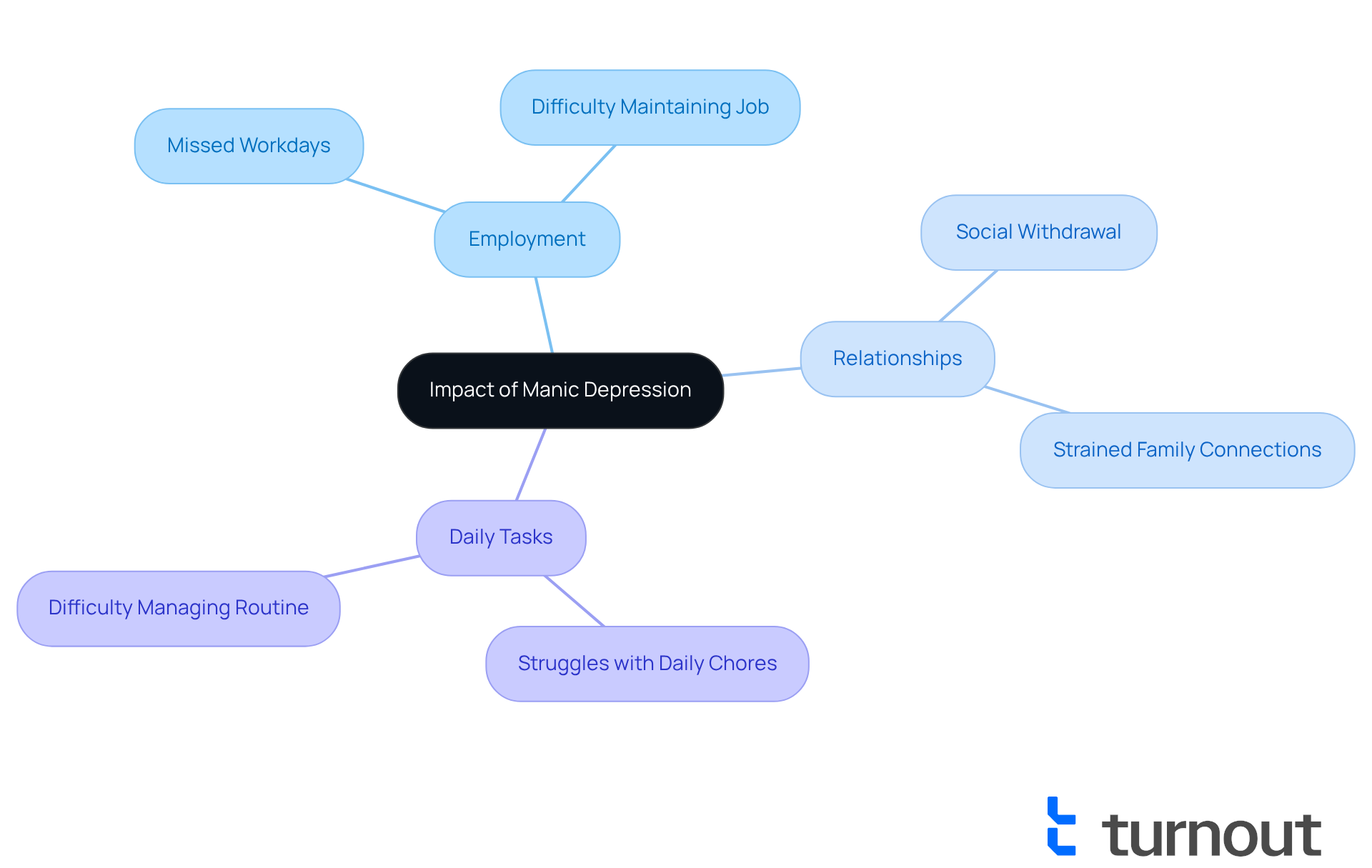
Identify Eligibility Criteria for Disability Benefits
If you are considering applying for disability for manic depression benefits, it's important to understand the specific criteria established by the Social Security Administration (SSA). We recognize that this process can be overwhelming, and we're here to help guide you through it. To qualify, you must demonstrate that your condition significantly limits your ability to perform essential work tasks. Here are the key factors to keep in mind:
- Medical Documentation: It's crucial to have a formal diagnosis from a qualified mental health professional.
- Severity of Symptoms: You need to show that your symptoms greatly impact your daily life, making it difficult to manage tasks and responsibilities.
- Duration: Your condition must have lasted, or be expected to last, at least 12 months.
The SSA's Blue Book outlines the criteria for mental disorders, including bipolar disorder, which is recognized as a disability for manic depression that may qualify for assistance. It's worth noting that about 29.1% of disabled workers receive benefits due to mental disorders, reflecting the success many have found in this area. If you're feeling uncertain about your eligibility, reaching out to a consumer advocacy group can provide you with valuable support and guidance throughout the enrollment process. Remember, you are not alone in this journey, and there are resources available to help you navigate these challenges.
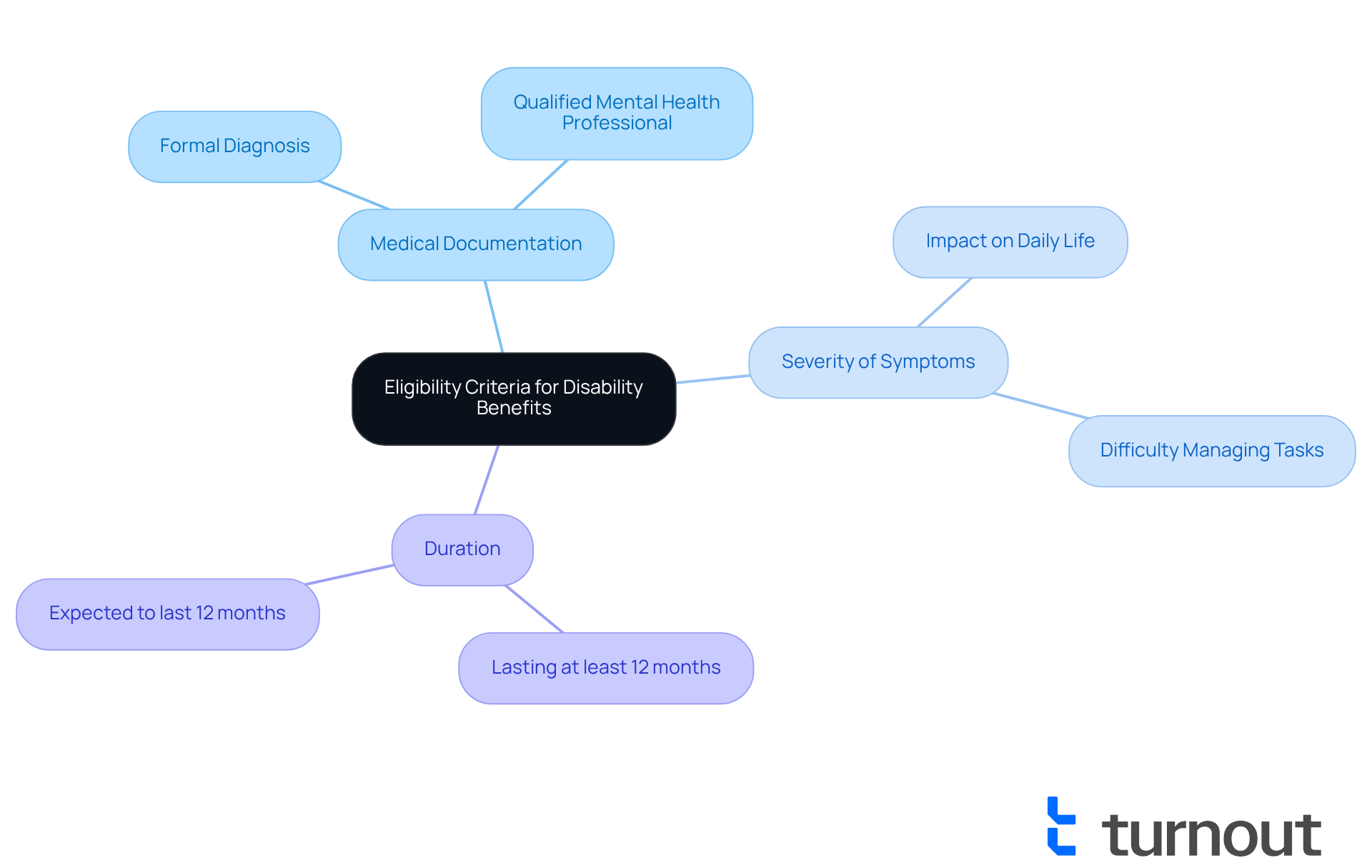
Collect Required Documentation and Medical Evidence
Collecting comprehensive documentation is a pivotal step in the application process for Social Security Disability (SSD) claims, particularly for individuals with a disability for manic depression. We understand that this can be a challenging journey, and we’re here to help you navigate it. Here’s what you need:
- Medical Records: Obtain records from all healthcare providers who have treated you for manic depression. This includes therapy notes, medication prescriptions, and hospitalization records. These documents are crucial in supporting your claim.
- Personal Statements: Write a detailed account of how your disability for manic depression affects your daily life. Include specific examples of challenges faced. This personal insight is invaluable for advocates at Turnout, who can assist you through the SSD claims process.
- Functional Capacity Evaluation: If possible, have a mental health professional conduct an evaluation that assesses your ability to perform work-related tasks. This evaluation can significantly strengthen your case.
- Support Letters: Gather letters from family, friends, or colleagues who can attest to the impact of your condition on your daily life. These testimonials provide further context and support your submission.
Ensure all documents are organized and clearly labeled to facilitate the review process. Remember, while Turnout provides support through trained nonlawyer advocates, they do not offer legal representation. Having thorough documentation is essential for a successful claim, and you are not alone in this journey.
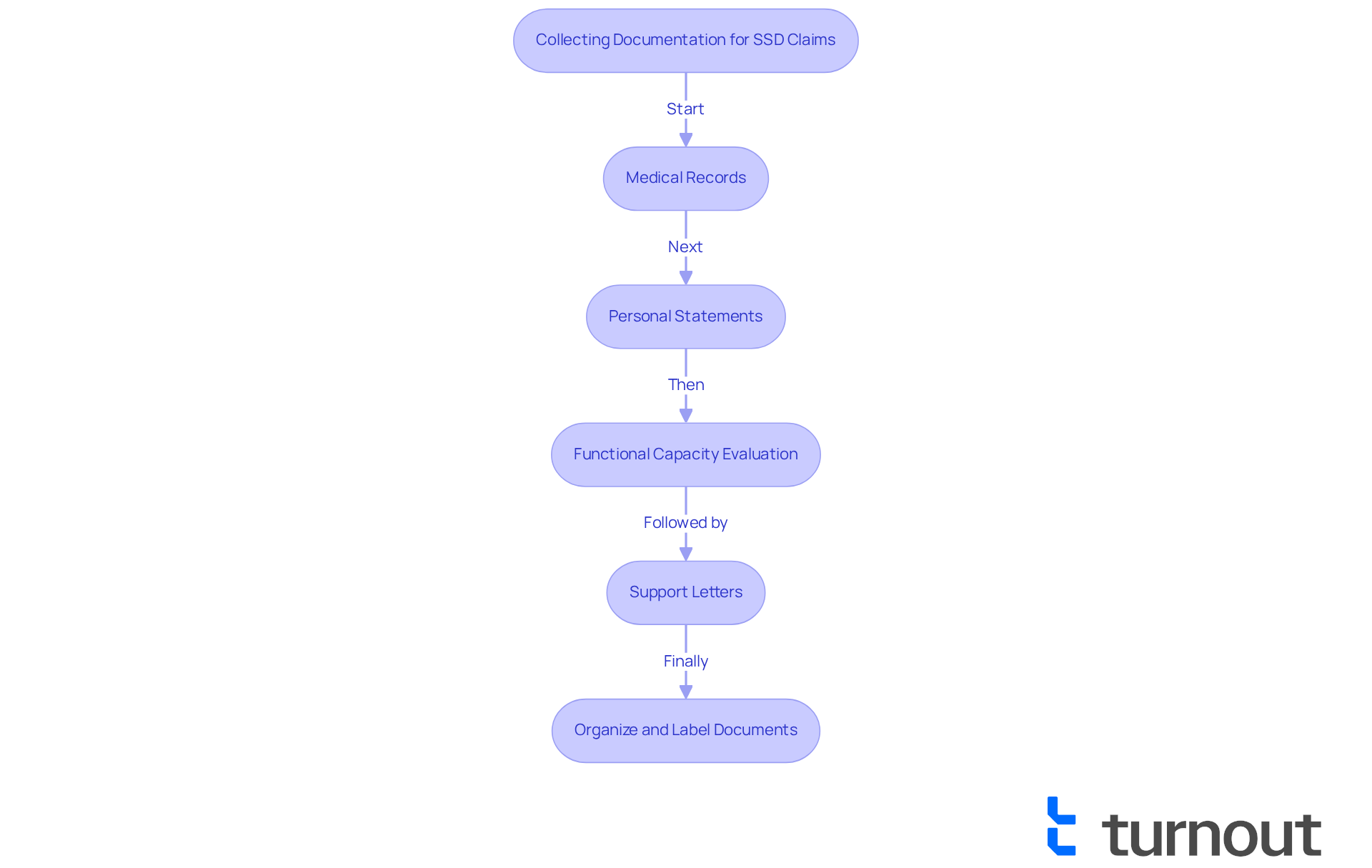
Complete the Disability Application Process
Completing the disability application can feel overwhelming, but we’re here to help you through it. Here are some key steps to guide you:
- Choose Your Application Method: You have options! Apply online through the SSA website, by phone at 1-800-772-1213, or in person at your local SSA office.
- Fill Out the Application: Take your time to provide detailed information about your medical condition, including any disability for manic depression, your work history, and how your condition affects your daily life. Being honest and thorough is crucial—did you know that 38% of applicants who meet technical requirements are accepted initially? However, 53% of those who appeal the initial decision are ultimately approved.
- Submit Your Documentation: Make sure to attach all required medical evidence and documentation to support your claim. The Disability Starter Kit can be a great resource, helping you prepare the necessary documents and understand the available programs.
- Follow Up: After you’ve submitted your application, it’s important to stay informed about its status. You can check online or contact the SSA. Keep in mind that the typical processing duration for SSI and SSDI submissions exceeds 200 days, so staying updated throughout this lengthy process is essential.
We understand that this journey can be challenging. Consider reaching out to Turnout's trained nonlegal advocates. They can help ensure your submission is thorough and accurately reflects your circumstances. These advocates are familiar with the SSD claims process and can guide you in avoiding common errors, such as insufficient medical documentation or failing to explain how your disability for manic depression affects your daily activities. Remember, you are not alone in this journey; we’re here to support you.
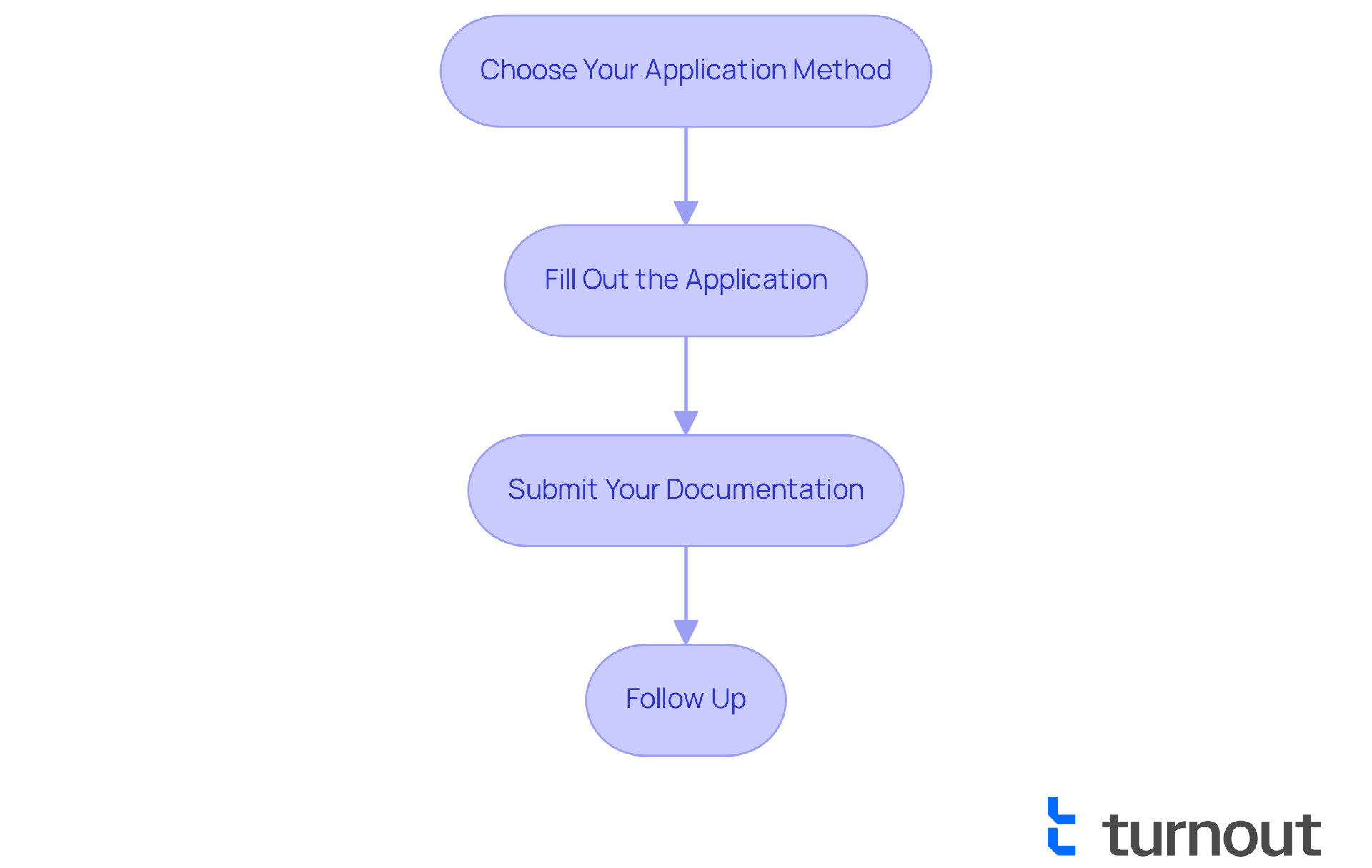
Navigate Challenges and Understand the Appeals Process
Even with thorough preparation, it can be disheartening to find that many initial applications for disability assistance are denied. If you find yourself in this situation, remember, you are not alone. Here’s how to navigate the appeals process with the compassionate support of Turnout:
- Review the Denial Letter: Take a moment to understand the reasons for denial. This will guide your next steps.
- Gather Additional Evidence: If needed, collect more medical documentation or personal statements that specifically address the reasons for denial. Strong medical evidence is crucial for demonstrating your eligibility for benefits.
- File an Appeal: Typically, you have 180 days from the date of the denial letter to file an appeal. The insurance company is required to notify you in writing about this timeframe. You can file your appeal online or by submitting a paper form. Ensure your appeal letter includes a clear statement of purpose, outlines your disability, discusses supporting evidence, and rebuts the insurer's reasons for denial.
- Attend the Hearing: If your appeal progresses to a hearing, prepare to present your case in front of an administrative law judge. Bring all pertinent documentation, and consider having a trained advocate from Turnout present to assist you.
Persistence is key; many applicants find success on appeal after an initial denial. For instance, individuals who effectively rebutted the insurer's reasons for denial with specific evidence have significantly improved their chances of a favorable outcome. As Teresa Breese expressed, "Words cannot express my gratitude for the competence, professionalism, and patience they displayed." Remember, you are not alone in this process—seeking assistance from Turnout can provide valuable insights and strategies to enhance your appeal.
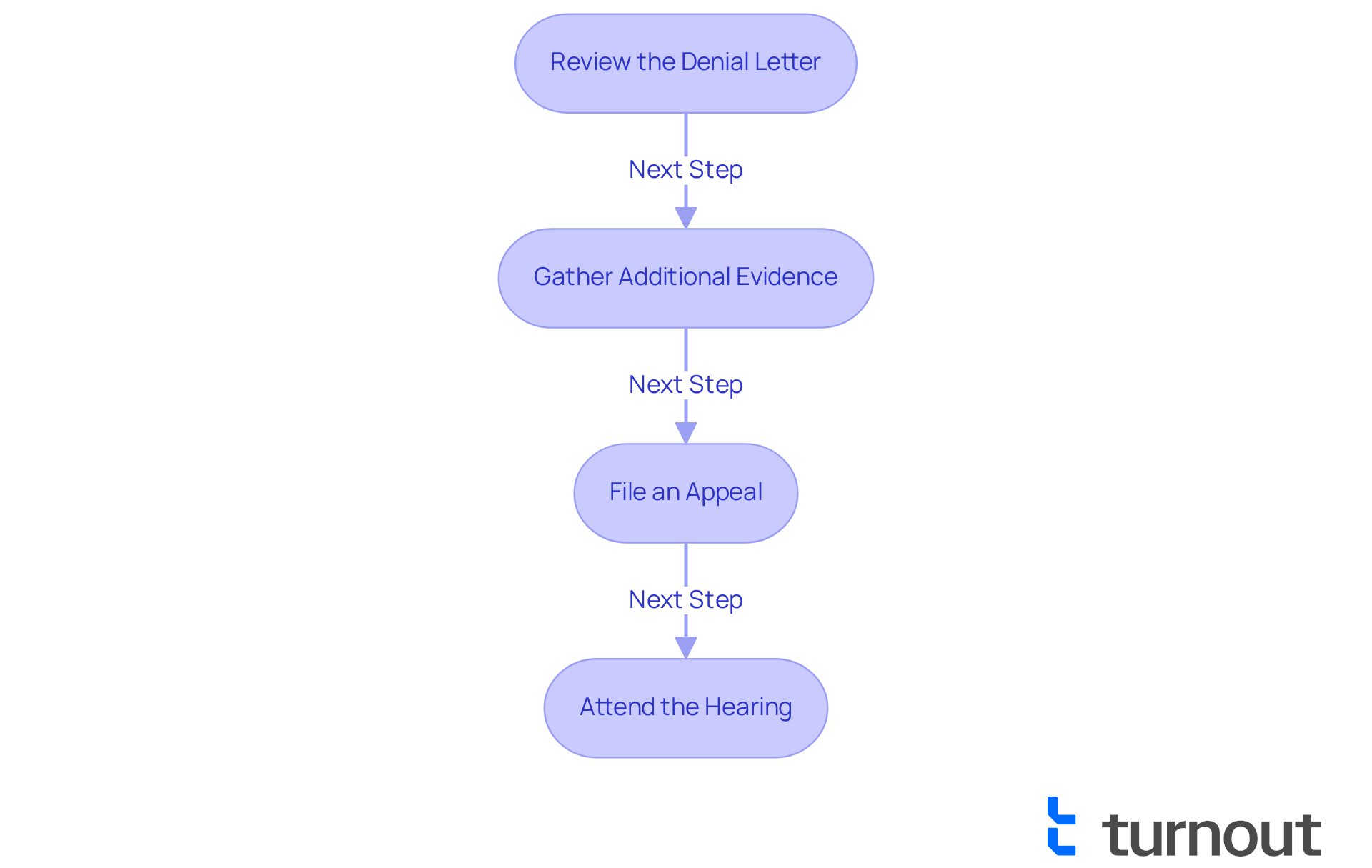
Conclusion
Navigating the process of securing disability benefits for manic depression can feel overwhelming. Yet, it is essential for those whose lives are significantly impacted by this condition. Understanding the nature of manic depression and its effects on daily functioning lays the groundwork for building a strong case for support. By recognizing the challenges faced in maintaining employment, relationships, and daily tasks, individuals can better articulate their needs and experiences throughout the application process.
This article outlines critical steps to successfully obtain disability benefits. It includes:
- Understanding eligibility criteria
- Gathering necessary documentation
- Completing the application process
Detailed medical records, personal statements, and support from advocates play a vital role in guiding applicants through the complexities of the Social Security Disability claims process. Even in the face of initial denials, there is potential for success. Persistence and gathering additional evidence can strengthen appeals.
Ultimately, the journey to secure disability support for manic depression is not one that must be faced alone. By leveraging available resources, such as compassionate advocacy groups, individuals can navigate these challenges with confidence. It's crucial to take proactive steps in documenting experiences and understanding the appeals process, as these actions can lead to a more favorable outcome. Seeking assistance and sharing personal stories can foster a sense of community and resilience. Remember, support is available, and every effort counts in the pursuit of well-deserved assistance.
Frequently Asked Questions
What is manic depression?
Manic depression, commonly known as bipolar disorder, involves significant mood swings that include emotional highs (mania or hypomania) and lows (depression).
How does manic depression affect daily life?
Manic depression can make it challenging to maintain employment, manage relationships, and complete routine tasks, leading to difficulties in everyday functioning.
What should I do to strengthen my case for disability support for manic depression?
It is vital to record specific challenges you face, such as missed workdays, social withdrawal, and struggles with daily chores, to provide personal insight when discussing your situation or during the application process.
Who can help me with the disability application process for manic depression?
Collaborating with compassionate nonprofessional advocates, such as those from Turnout, who specialize in SSD claims, can make a significant difference in navigating the application process.
What are the eligibility criteria for disability benefits for manic depression?
To qualify for disability benefits, you must demonstrate that your condition significantly limits your ability to perform essential work tasks, which includes having medical documentation, showing the severity of symptoms, and proving that the condition has lasted or is expected to last at least 12 months.
Where can I find the criteria for mental disorders recognized by the SSA?
The SSA's Blue Book outlines the criteria for mental disorders, including bipolar disorder, which may qualify for disability assistance.
What percentage of disabled workers receive benefits due to mental disorders?
Approximately 29.1% of disabled workers receive benefits due to mental disorders, indicating the success many have found in obtaining assistance.
What should I do if I'm uncertain about my eligibility for disability benefits?
If you feel uncertain about your eligibility, reaching out to a consumer advocacy group can provide valuable support and guidance throughout the enrollment process.




